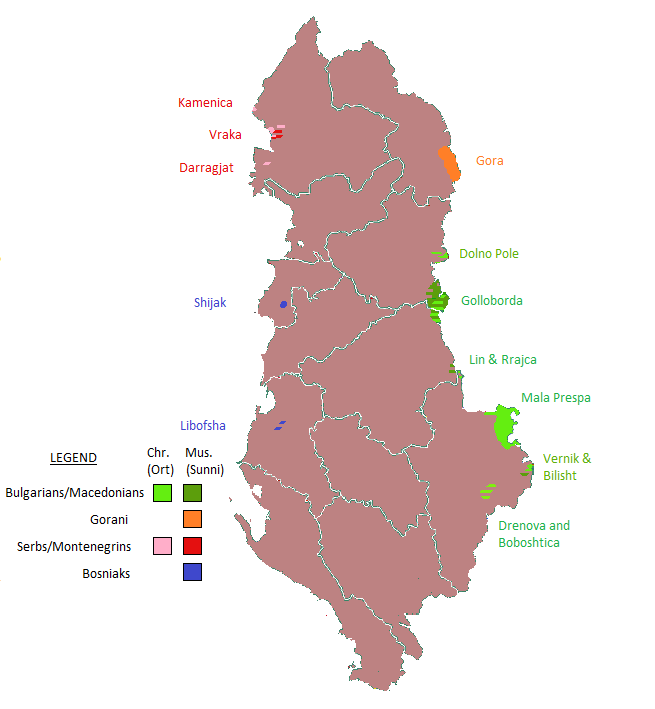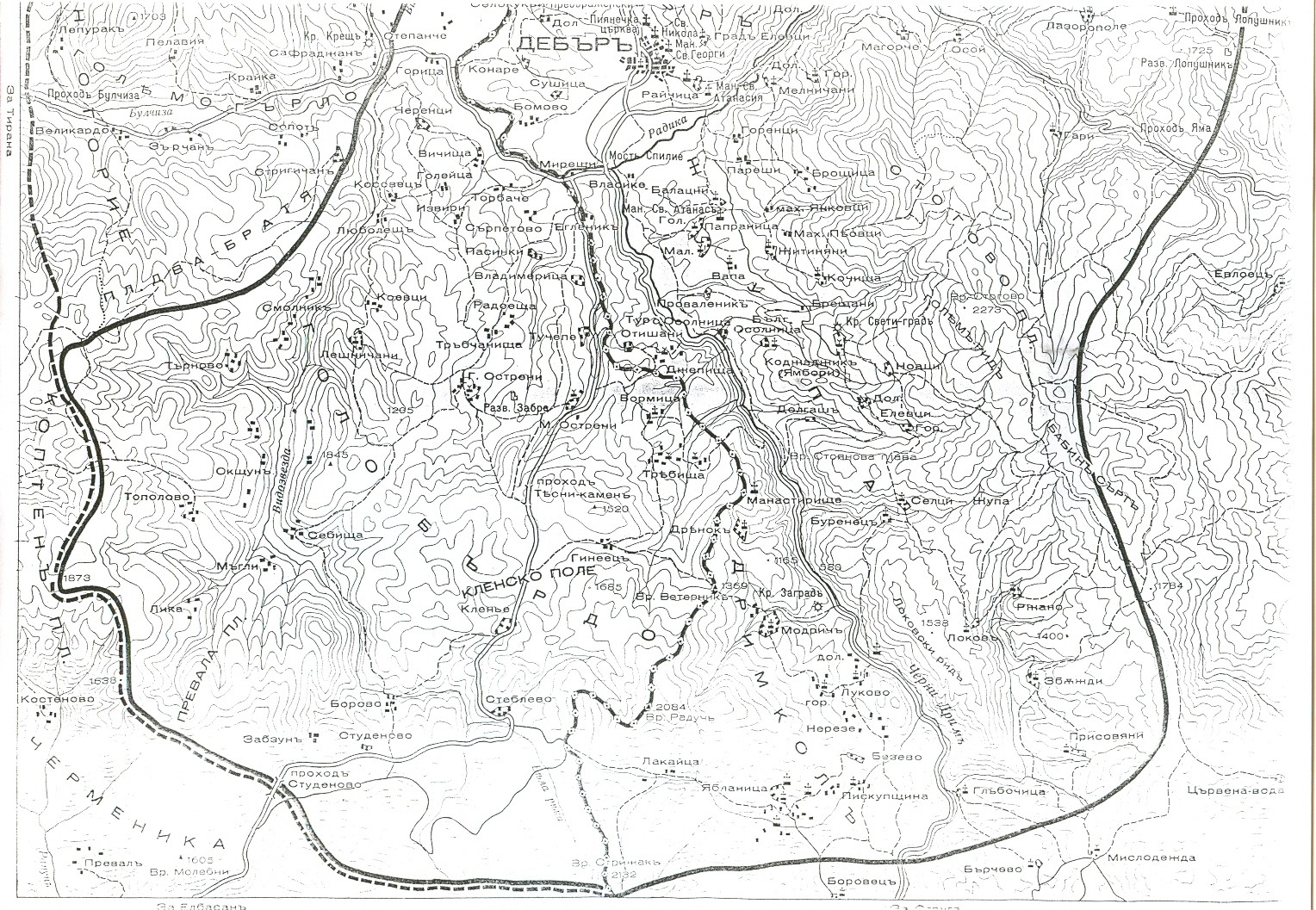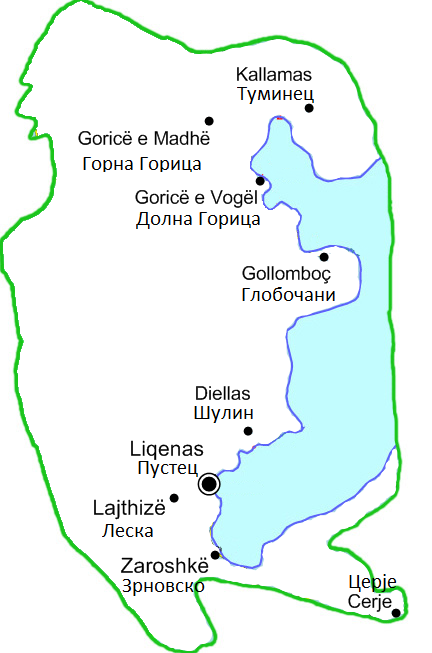|
Mala Prespa
Mala Prespa ( Macedonian and bg, Мала Преспа, ) is a term used to denote a geographical area in eastern Albania, part of the wider region of Prespa. It is located on the western shore of Lake Prespa along the southeastern edge of Albania within the wider Korçë County and bordering the Pogradec and Devoll municipalities. The area is synonymous with Pustec Municipality. It is officially recognised as a Macedonian minority zone. According to the 2011 Census, in Albania there are about 5,000 Macedonians, primarily in the Mala Prespa area, forming 97% of the population of the Pustec Municipality. This area also contains small numbers of Aromanians (''Arvanito-Vlachs'') and Bulgarians.Mediapool.bg 14.10.2017Албания призна българското национално малцинство./ref> See also *Macedonians in Albania *Bulgarians in Albania *Gollobordë Gollobordë ( sq-definite, Golloborda, bg, Голо Бърдо/Golo Bărdo, mk, Голо Брд ... [...More Info...] [...Related Items...] OR: [Wikipedia] [Google] [Baidu] |
Bulgarians In Albania
Ethnic Bulgarians in present-day Albania live mostly in the areas of Mala Prespa, Gollobordë and Gora. According to the Bulgarian State Agency for Bulgarians Abroad, 40,000 to 50,000 persons of Bulgarian origin are living in Albania. Ethnic identity can be fluid among the Albania's Slavophonic population, who might identify as Albanian, Bulgarian or Macedonian, depending on the circumstances.INTERNATIONAL CENTRE FOR MINORITY STUDIES AND INTERCULTURAL RELATIONS (IMIR)ALBANIA:LANDMARKS OF TRANSITION Valeri Grigorov p.18 Between 2001 and 2016, around 4,470 Albanian nationals applied for a Bulgarian citizenship and over 2,600 of them were granted one. The Bulgarian minority was recognized by the Albanian government in October 2017. History Middle Ages and Ottoman period The first reference to a Slavic presence in Albania dates to 548, when the Slavs reached Epidamnos (Durrës), capturing fortresses in the city's vicinity. Slavic settlement near Epirus in southern Albania is ment ... [...More Info...] [...Related Items...] OR: [Wikipedia] [Google] [Baidu] |
Macedonians (ethnic Group)
Macedonians ( mk, Македонци, Makedonci) are a nation and a South Slavs, South Slavic ethnic group native to the region of Macedonia (region), Macedonia in Southeast Europe. They speak Macedonian language, Macedonian, a South Slavic language. The large majority of Macedonians identify as Eastern Orthodox Christians, who speak a South Slavic language, and share a cultural and historical "Orthodox Byzantine–Slavic heritage" with their neighbours. About two-thirds of all ethnic Macedonians live in North Macedonia and there are also Macedonian diaspora, communities in a number of other countries. The concept of a Macedonian ethnicity, distinct from their Orthodox Balkan neighbours, is seen to be a comparatively newly emergent one. The earliest manifestations of an incipient Macedonian identity emerged during the second half of the 19th century among limited circles of Slavic-speaking intellectuals, predominantly outside the region of Macedonia. They arose after the Firs ... [...More Info...] [...Related Items...] OR: [Wikipedia] [Google] [Baidu] |
Historical Regions In Albania
History (derived ) is the systematic study and the documentation of the human activity. The time period of event before the invention of writing systems is considered prehistory. "History" is an umbrella term comprising past events as well as the memory, discovery, collection, organization, presentation, and interpretation of these events. Historians seek knowledge of the past using historical sources such as written documents, oral accounts, art and material artifacts, and ecological markers. History is not complete and still has debatable mysteries. History is also an academic discipline which uses narrative to describe, examine, question, and analyze past events, and investigate their patterns of cause and effect. Historians often debate which narrative best explains an event, as well as the significance of different causes and effects. Historians also debate the nature of history as an end in itself, as well as its usefulness to give perspective on the problems of the p ... [...More Info...] [...Related Items...] OR: [Wikipedia] [Google] [Baidu] |
Gollobordë
Gollobordë ( sq-definite, Golloborda, bg, Голо Бърдо/Golo Bărdo, mk, Голо Брдо/Golo Brdo) refers to a geographical area of traditionally 24 villages of which 18 are situated primarily in eastern Albania, with a small portion consisting of six villages lying within North Macedonia. This region is located within the Dibër and Elbasan counties which contain both Macedonian and Albanian villages. This region, like neighboring regions, has historically been economically linked to the city of Debar, which was traditionally referred to by inhabitants as simply "the City". History Ottoman period The Islamization process is held to have occurred in Golloborda relatively late in Ottoman times.Toncheva, Veselka (2013). "The Slavonic Community from the Golo Bardo Region, Republic of Albania: Traditions, Music, Identity". ''Our Europe. Ethnography – Ethnology – Anthropology of Culture''. Volume 2. Pages 40–42 In 1519, the region was still entirely Christian.Lima ... [...More Info...] [...Related Items...] OR: [Wikipedia] [Google] [Baidu] |
Macedonians In Albania
The Macedonians in Albania ( mk, Македонци во Албанија, Makedonci vo Albanija; sq, Maqedonasit në Shqipëri) are an officially recognized ethnic minority. According to the 2011 census, 5,512 ethnic Macedonians live in Albania. In the 1989 census, 4,697 people had declared themselves Macedonian. In some circumstances, ethnic identity can be fluid among Albania's Slavophonic population, who may identify as Macedonian or Bulgarian, depending on the circumstances. Albanian Slavs are targeted by "Bulgarian cross-border nationalism" and, as an EU member, Bulgaria offers more benefits to this minority than Macedonia does. According to Edmond Temelko, former mayor of the Pustec Municipality, " ..Bulgaria uses heavy economic situation of Macedonians in Albania to offer them Bulgarian citizenship, passports and employment opportunity". The condition of the Macedonian population living in the Prespa area is described in positive terms and particular praise is given sinc ... [...More Info...] [...Related Items...] OR: [Wikipedia] [Google] [Baidu] |
Bulgarians
Bulgarians ( bg, българи, Bǎlgari, ) are a nation and South Slavic ethnic group native to Bulgaria and the rest of Southeast Europe. Etymology Bulgarians derive their ethnonym from the Bulgars. Their name is not completely understood and difficult to trace back earlier than the 4th century AD, but it is possibly derived from the Proto-Turkic word ''*bulģha'' ("to mix", "shake", "stir") and its derivative ''*bulgak'' ("revolt", "disorder"). Alternative etymologies include derivation from a compound of Proto-Turkic (Oghuric) ''*bel'' ("five") and ''*gur'' ("arrow" in the sense of "tribe"), a proposed division within the Utigurs or Onogurs ("ten tribes"). Citizenship According to the Art.25 (1) of Constitution of Bulgaria, a Bulgarian citizen shall be anyone born to at least one parent holding a Bulgarian citizenship, or born on the territory of the Republic of Bulgaria, should they not be entitled to any other citizenship by virtue of origin. Bulgarian citizenship sh ... [...More Info...] [...Related Items...] OR: [Wikipedia] [Google] [Baidu] |
Aromanians
The Aromanians ( rup, Armãnji, Rrãmãnji) are an Ethnic groups in Europe, ethnic group native to the southern Balkans who speak Aromanian language, Aromanian, an Eastern Romance language. They traditionally live in central and southern Albania, south-western Bulgaria, northern and central Greece and North Macedonia, and can currently be found in central and southern Albania, south-western Bulgaria, south-western North Macedonia, northern and central Greece, southern Serbia and south-eastern Romania (Northern Dobruja). An Aromanian diaspora living outside these places also exists. The Aromanians are known by several other names, such as "Vlachs" or "Macedo-Romanians" (sometimes used to also refer to the Megleno-Romanians). The term "Vlachs" is used in Greece and in other countries to refer to the Aromanians, with this term having been more widespread in the past to refer to all Romance-speaking peoples of the Balkan Peninsula and Carpathian Mountains region (Southeast Europe) ... [...More Info...] [...Related Items...] OR: [Wikipedia] [Google] [Baidu] |
Pustec Municipality
Pustec Municipality ( sq, Bashkia Pustec; mk, Општина Пустец, ''Opshtina Pustets''), previously known as Liqenas Commune ( sq, Komuna Liqenas) from 1973 to 2013, is a municipality in the Korçë County of Albania. The population at the 2011 census was 3,290, in a total area of 243.60 km2. The municipality's flag features the Vergina Sun. It consists of nine villages, comprising the areas along the Albanian, the southwestern shore of Lake Prespa. It is part of the so-called Mala Prespa area, which is home to a large part of the local ethnic Macedonian minority of Albania.“ON THE STATUS OF THE MINORITIES IN THE REPUBLIC OF ALBANIA” Albanian Helsinki Comm ... [...More Info...] [...Related Items...] OR: [Wikipedia] [Google] [Baidu] |
Pustec Multilingual Road Signs
Pustec ( sq, Pustec; mk, Пустец) formerly known as Liqenas (1973–2013), is a village in Pustec Municipality, Korçë County, eastern Albania. Situated on the southwestern shore of Lake Prespa, it is home to much of the Macedonian minority in Albania. Geography Pustec is located on the southwestern shore of Lake Prespa and is the nearest village to the island of Maligrad. It sits at an elevation of above sea level. To the northeast, along the lake, lies Shulin, while in the southeast is the village of Leska. Pustec and the surrounding region lie within the Prespa National Park. History The village of Pustec was mentioned in the Slepche Beadroll from the 16th century. The survey by Dimitar Mishev (D. Brancoff) from 1905 shows that the inhabitants of the village of Pustec ( bg, Пустец) were in the bosom of the Bulgarian Exarchate. There were 400 Bulgarian Exarchists in the village. The French linguist André Mazon in his study on Slavic folklore in Albania ... [...More Info...] [...Related Items...] OR: [Wikipedia] [Google] [Baidu] |
Devoll (municipality)
Devoll (; sq-definite, Devolli) is a municipality in Korçë County, southeastern Albania. The municipality consists of the administrative units of Hoçisht, Miras, Progër and Qendër Bilisht with Bilisht constituting its seat. As of the Institute of Statistics estimate from the 2011 census, there were 26.716 in Devoll Municipality. It derives its name from the Devoll River flowing through the valley. The border point Kapshticë/Krystallopigi connects Devoll with the Greek regional units of Florina and Kastoria to the east and southeast. Devoll borders the municipalities of Kolonjë to the southwest, Korçë to the west, Maliq to the northwest and Pustec to the north. The area of the municipality is 453.27 km2. History Excavations at Tren cave unearthed Mycenaean Greek pottery of the Late Bronze Age. This appears to be of possible local manufacture. The medieval era Devol fortress was the location where the Treaty of Devol between Bohemond I of Antioch and Byzantine Em ... [...More Info...] [...Related Items...] OR: [Wikipedia] [Google] [Baidu] |
Pogradec
Pogradec () is the eleventh most populous city in Albania and the capital of the eponymous municipality. It is located on a narrow plain between two mountain chains along the southwestern banks of the Lake of Ohrid. Its climate is profoundly influenced by a seasonal Mediterranean and Continental climate. The total population is 61,530, of which 20,848 in the municipal unit (the pre-2015 municipality) Pogradec (2011 census). Pogradec and its surroundings were listed by UNESCO as a World Heritage Site as part of the natural and cultural heritage of the region of Ohrid. Nevertheless, the Illyrian Royal Tombs in the adjacent unit of Proptisht are on the Albanian tentative list for becoming a World Heritage Site. Etymology The name of the town is Eastern South Slavic in origin. Pogradec comes from ''Po(d)'' (under/beneath) and '' Gradec'' (town, city, castle or fortified settlement) and means literally "under the city". This is a reference to the ancient Illyrian settlement, ... [...More Info...] [...Related Items...] OR: [Wikipedia] [Google] [Baidu] |



.jpg)





